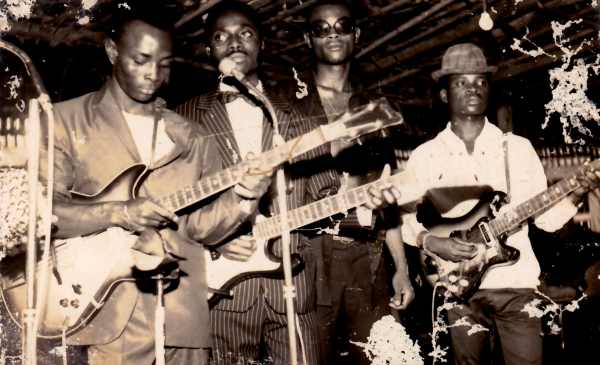

Gnonnas Pedro & His Dadjes
It’s also worth mentioning that on Redjeb’s first trip to Benin, also in 2005 and for the express purpose of finding more about Gnossas Pedro and his music, he was greeted with posters paying tribute to “Le Boabab,” as Pedro was called, as he had died the year previous. However, after Redjeb explains some of the hassles he went through trying to license the music in the booklet that accompanies this collection, the 20 year wait between his initial discovery and this collection’s release starts to make sense.
And because West Africa was crawling with bands who could play Cuban music, and also because Pedro had been a serious student of the Cuban son prior to forming the Dadjes, it’ll come as no surprise that much of what’s here is radically Latin-inspired. In fact, there’s a cover of Beny Moré’s “Yiri Yiri Bon” as well as Tito Puente’s “Pare Cochero” (re-titled “El Cochechivo”) among others. This also explains why the tribute posters Redjeb saw in ’05 referred to Pedro as “our national salsero.” But Pedro’s own compositions, as well as Beninese rhythms, such as agbadja, are here too. The collection begins with a 1983 re-make of his 1966 hit “Dadje Von O Von Non”, which stays loyal to the original, though the horns chop harder and the contagious, stuttering groove lasts longer. The gently percolating “Mo Ngbadun Re” gives shout outs to other groundbreaking Beninese bands such as El Rego, the Black Santiagos, and Annasoua Jazz.
One of the reasons that, by the mid-seventies, there was a wealth of recorded talent in Benin was largely due to the Societé Africaine de Techniques Electroniques, a recording facility with its own pressing plant, something that transformed the tiny West African country into one of the region’s major producers of vinyl records, allowing Pedro and others to release their output on record labels from Contonou, Benin’s largest city. The ability for Benin to be musically independent for the next few years brought multi-instrumentalist Pedro and his Dadjes stardom, with their take on Moré’s “Yiri Yiri Bon” in particular blasting out of radio stations across the country. And while Pedro re-emerged in the 1990s the pan-African ensemble Africando, after the 80’s saw political turmoil end Benin’s musical golden age, it’s the music contained here that brought him so much regional love and attention.
Brooding, Cuban-influenced tracks such as "Adigbedoto" hit hard, modernizing Benin's centuries-old rhythms and allowing the country to prove itself a formidable musical force to rival its neighbor Nigeria. Analog Africa has done more than anyone to bring essential devotion to the country's initial popular music revolution, and this release, a long time coming, allows us to hear more of one of the country's most crucial musicians.
Search RootsWorld
|